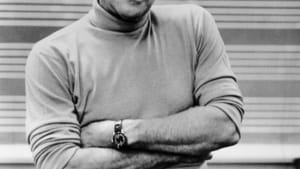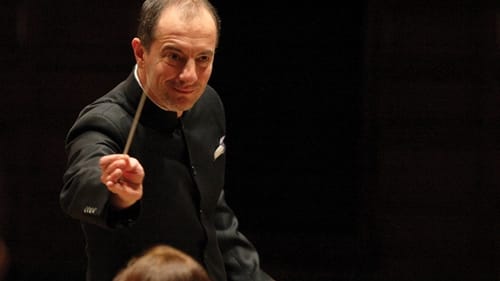Stay in the Loop
BSR publishes on a weekly schedule, with an email newsletter every Wednesday and Thursday morning. There’s no paywall, and subscribing is always free.
Lenny's lighter side
Princeton Symphony Orchestra's 'A Bernstein Celebration' with Daniel Rowland and Meghan Picerno

The Leonard Bernstein centenary pushes on, most recently with the excellent Princeton Symphony Orchestra under Rossen Milanov. This week, the company presented a selection of the American composer’s lighter fare in A Bernstein Celebration.
Although not advertised as a “pops” concert, the orchestra's focus was on West Side Story, On the Town, and Candide. This emphasis assured an evening of sparkling tunes, beguiling discords, and a flash of honky-tonk typical of the Bernstein style.
Like most music lovers who grew up in the second half of the 20th century, I owe much to Bernstein. Though I missed the Young People’s Concerts on TV, Bernstein was a presence and inspiration from the 1960s through the ‘80s.
It’s probably too early to know whether his most enduring legacy will be as composer, conductor, educator, or celebrity. But there is still plenty of his music — ranging from choral and symphonic works to show tunes — to intrigue, please, and even captivate 21st-century listeners.
'Candide' overload
The program began with “Three Dance Episodes” from On the Town, followed by West Side Story’s "Suite for Violin and Orchestra," arranged by William David Brohn and featuring violin soloist Daniel Rowland.
After intermission, it was Candide overload, with the effervescent "Overture" followed by the showstopper, “Glitter and Be Gay,” sung memorably by soprano Meghan Picerno. The program concluded with a Candide suite, arranged by Charlie Harmon.
In the world of Broadway, composers do not always arrange and orchestrate their own compositions, but for an all-Bernstein tribute, I would have preferred to hear works entirely composed by the master himself. Surely, I am not alone in expecting a composer to complete each detail of a composition, including the sometimes onerous but often revelatory process of orchestration. Otherwise, the work should have a split byline, such as “Rhapsody in Blue” by Gershwin and Grofé.
However, whether we were hearing Bernstein’s best work or not, Milanov and the orchestra were in top form. The “Three Dance Episodes” played out with verve and snappy pacing. The episodes formed a three-movement suite: the second section was bluesy with hints of a Copland-esque musical landscape; the third movement featured a sassy Swingtime clarinet, and three trombones blasted the “New York, New York” theme. It may have been show music, but it was bumped up a notch and treated with style.

I was less satisfied with West Side Story's suite. The arranger respectfully treated each theme to its own orchestral context, but the work did not cohere. The effect as each theme was introduced resembled someone pointing out, “Oh, listen to that: it’s 'Maria'! And isn’t that 'There’s a Place for Us'?" It was at once choppy and too long.
Crowdpleasers
Rowland’s performance was often compelling and lyrical, but the violin’s upper register sounded a bit scratchy. On the other hand, his presentation of the cadenza was focused and conveyed sheer effortlessness. There were some remarkable moments of virtuosity and empathy between soloist and orchestra. The work included some lovely solo passages by cello, flute, and oboe.
The Candide overture is a crowd-pleaser and one of the show’s two most memorable elements. I once heard it performed by William Smith and the Philadelphia Orchestra with such vivacity that the conductor turned from the cheering audience back to the musicians — who played the whole piece again.
While that didn’t happen here, the performance was fast-paced, crisp, and enthusiastic. The other great thing about Candide is its challenging soprano aria, “Glitter and Be Gay.” In it, the character Cunegonde explains that she resorted to a sordid life to obtain the luxuries she craved.
The aria is a kind of musical fit of mania in which the singer alternates between ecstasy and despair, yet projects a disarming cuteness. In Princeton, this mania culminated in Cunegonde stripping necklaces off several musicians, grabbing a tiara dangled tantalizingly above her by the conductor, and giving him a hug and kiss. Pure sweet confection for the audience, powerful singing and acting by Picerno.
The program concluded with the Candide suite, basically a rehash of the overture with a few additional fragments of the show not illustrious enough to make the overture. I left happy to have heard about half the music presented, but still craving a taste of Jeremiah, Chichester, or even Bernstein’s Mass, all pointing to a brighter star of greatness.
What, When, Where
A Bernstein Celebration. Daniel Rowland, violin; Meghan Picerno, soprano; Rossen Milanov conducted, Princeton Symphony Orchestra. September 29-30, 2018, at the Princeton University's Richardson Auditorium, 60 Nassau Street, Princeton, New Jersey. (609) 497-0020 or princetonsymphony.org.
Sign up for our newsletter
All of the week's new articles, all in one place. Sign up for the free weekly BSR newsletters, and don't miss a conversation.

 Linda Holt
Linda Holt